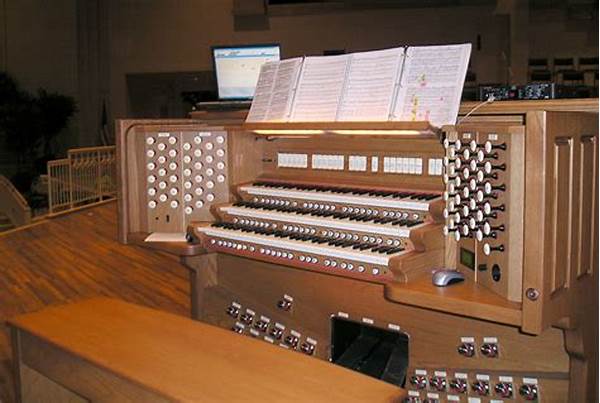In the realm of classical music, few instruments have left an indelible mark on composers like Bach and Handel as the grand and majestic organ. Its intricate pipes and majestic sound reverberate through the hallowed halls of history, enchanting musicians and audiences alike. Imagine walking into a vast cathedral, where the melodic reverberations of an organ elevate the space into a sanctuary of divine sound. This is not just an instrument; it is a powerful force that has inspired some of the greatest musical masterpieces ever composed.
Read More : Traditional, Modern, Programmable Digital Angklung Instrument
Yet, what is it about the organ that captivates the hearts and minds of legendary composers? How did this king of instruments become the muse for Bach and Handel, generating unparalleled compositions that continue to echo in concert halls and cathedrals worldwide? Join us as we delve into the fascinating story of the organ’s influence over these illustrious figures and explore the profound impact of its soundscape on the classical music landscape.
The Legacy of the Organ
The organ is often referred to as the ‘King of Instruments,’ and for a good reason. Its origins date back to Ancient Greece, but it was during the Baroque era that it found its place as a staple in European worship and concert music. The organ’s power to fill large spaces with its resonant sound makes it uniquely suited for both solitary and collaborative compositions.
Johann Sebastian Bach, a name synonymous with baroque music, was profoundly influenced by the organ. Many of his works were written with this instrument in mind, from fugues and toccatas to chorale preludes. Bach’s exposure to the organ began in his youth, and it was at the core of his musical expression throughout his life. His intuitive understanding of the organ’s capabilities allowed him to compose pieces that featured complex contrapuntal textures and expressive harmonies, inspiring generations of composers who followed.
Handel’s Harmonious Homage
George Frideric Handel, another giant of baroque music, also found immense inspiration in the organ. Known for his operas, oratorios, and concerti grossi, Handel utilized the organ to explore both dramatic and tender emotions in his compositions. The instrument’s ability to weave intricate melodic lines and its versatile dynamic range offered Handel a palette to create rich and memorable works.
One of Handel’s most famous works, “Messiah,” features the organ prominently, adding to the grandeur of this choral masterpiece. His organ concertos further showcase the instrument’s versatility, blending melodies seamlessly with orchestral arrangements. The organ, in Handel’s hands, became a channel for human spirituality, highlighting his ability to bring profound emotional depth to his music.
The Technical Marvel of the Organ
Craftsmanship and Complexity
The construction of an organ is an art form in itself. Each organ is a unique masterpiece, tailored to the acoustics of its environment. Its pipes range from a few inches to over 30 feet, each contributing to the organ’s vast tonal palette. The organ’s console, with its keyboards and pedals, offers endless possibilities for musical creativity, allowing the performer to command a symphony of sound singlehandedly.
A Conduit for Creativity
The complexity of the organ’s structure allows for a wide range of sounds, from delicate whispers to thunderous crescendos. Composers like Bach and Handel were drawn to this versatility, using it to convey expansive emotional narratives within their pieces. The organ’s power to unify melody and harmony offers composers a vast canvas upon which to paint their musical visions.
Read More : Science Instruments For Middle School Students
Modern Impact of the Organ
While the organ’s golden age might be associated with the baroque period, its influence permeates contemporary music. Many modern composers and musicians continue to explore its rich sound, incorporating it into various genres from classical to rock. The timeless allure of the organ continues to inspire new generations, underscoring its enduring relevance in a constantly evolving musical landscape.
Preserving a Musical Legacy
Today, efforts to preserve historical organs are undertaken by dedicated craftsmen and enthusiasts who recognize the instrument’s cultural significance. These efforts ensure that the organ remains an integral part of our musical heritage, offering audiences the chance to experience the same majesty that inspired the likes of Bach and Handel.
Detailed Insights into the Organ’s Influence
The organ’s legacy is not only its historical significance but also its ongoing contribution to the world of music. Here are some detailed insights into how the organ inspired composers like Bach and Handel, impacting their work and the broader musical tradition:
Conclusion
The Timeless Appeal of the Organ
The organ’s impact on classical music is both deep and wide, with composers like Bach and Handel leading the charge. Through their compositions, the organ transcended its role as a mere instrument, transforming into a powerful medium for emotional expression and innovation.
Resonating Through Time
As we continue to appreciate the works inspired by the organ, its sounds resonate beyond their origins, influencing new generations of musicians and composers. The organ remains a testament to the enduring power of music to inspire, uplift, and connect us across centuries.
A Call to Embrace the Organ’s Legacy
For those who haven’t experienced an organ’s live performance, it’s a must-add to your musical bucket list. Witnessing a skilled organist at work is a breathtaking encounter that leaves an indelible mark on the soul.
In summary, the organ remains an unparalleled source of inspiration within the musical realm. Its monumental influence on composers like Bach and Handel underscores its timeless status as the King of Instruments, continuing to inspire awe and admiration.
